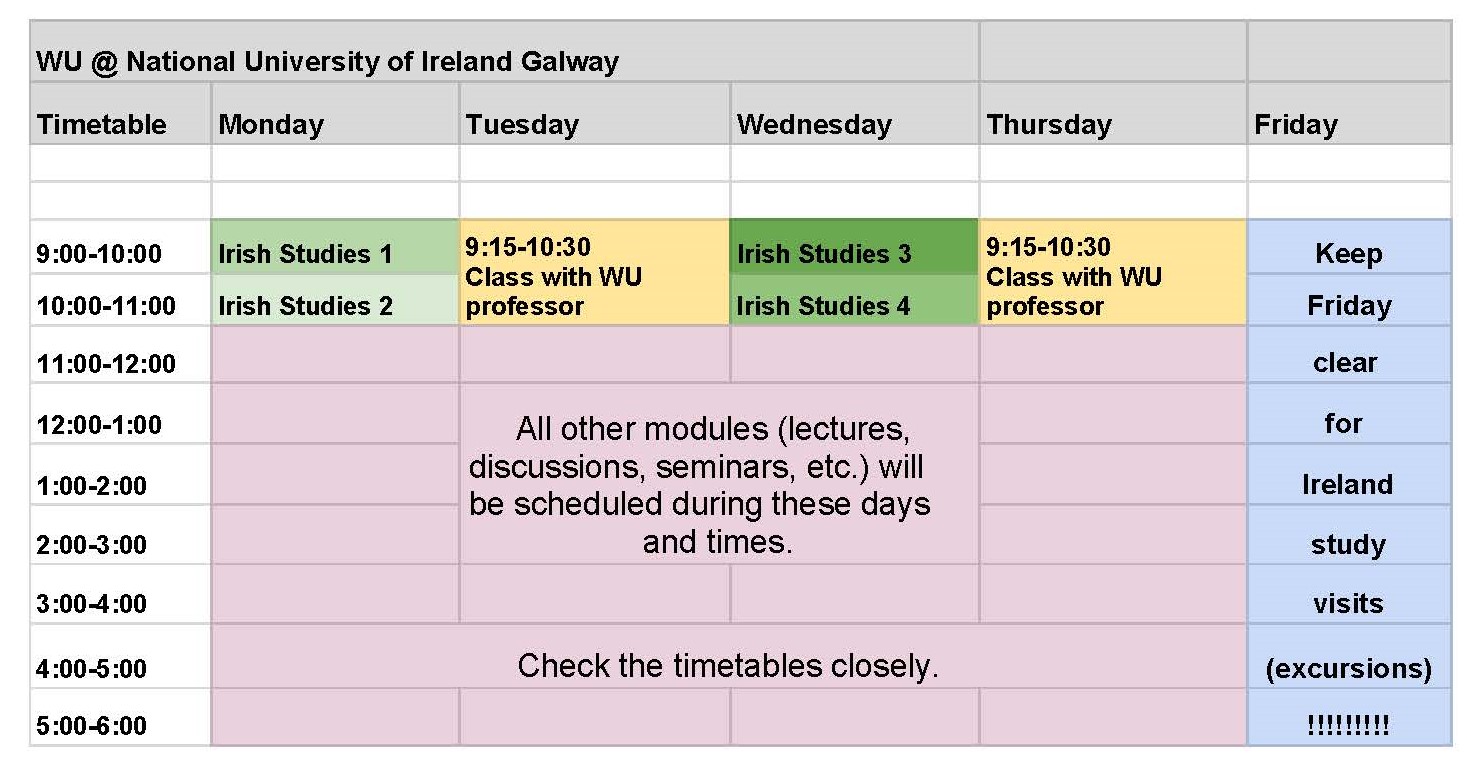The National University of Ireland, Galway is located on the banks of the river Corrib in Western Ireland. Galway is a modern urban center of 80,000 people that is known to many as a cultural center of Ireland. A Willamette professor teaches one course to the program students and accompanies the excursions with a local guide. Excursions may include Dublin, Northern Ireland, and Cork. Minimum GPA required by host program: 3.0 GPA, or 2.8 GPA with letter from faculty advisor.
Program Overview
The Galway program takes place in the spring semester from early January until mid to late May at the National University of Ireland, Galway. A Willamette professor accompanies the student group to Galway as the Program Faculty Leader. This faculty member teaches a course that has a topical focus related to Ireland and leads excursions to various locations throughout the semester. The spring 2024 Program Faculty Leader will be Tabitha Knight, Assistant Professor of Economics.
Money and the Economics of Ireland
In this introductory course, students will use a hands-on approach to the exploration of the Irish Economy and the use of money with the aid of the tools of the European Central Bank (ECB). By delving into the unique historical circumstances, political systems, institutions, and social norms, students will discover how a unique confluence of factors creates an economic system and how the economic system uses institutions like the ECB to function in present-day capitalism. We will also take a contemporary perspective on the Irish economy by discussing the global financial crisis from its origins in the United States to its implications for Ireland as well as the impact of COVID-19 on the economy. Basic macroeconomic indicators, such as gross domestic product and inflation, and tools, including monetary and fiscal policies, will be introduced and discussed with a culminating project on the Irish economy.
No pre-requisite. This topical course is available to those without any prior economics education.
Academic Life at NUIG
Find NUIG classes: (Classes are called "Courses" or "Modules")
While at NUIG, students take an Irish Studies course (4.0 WU credit) that provides an introduction to Irish culture through four lenses: Literature in Irish, Irish Literature in English, Irish History, and Irish Society. Students take a second course (4.0 WU credit) taught by a WU professor and two or three additional courses from NUIG (credit varies).

The university has approximately 17,000 students and offers a large variety of courses to choose from. This program offers the best fit for humanities and social science majors due to course scheduling of NUIG classes with the WU program classes and excursion schedules. All participants should have a good deal of flexibility about the local classes they can take from NUIG. Courses available to visiting students can be found in the Visiting Student Handbook Semester 2.
Find a list of classes for visiting students here: Visiting Student Handbook Semester 2
Housing
Students live in nearby student housing, sharing a bedroom with American or Irish students. Bathrooms and kitchen facilities are shared with six or more students.
Your life in Galway
At NUI Galway there are many societies and club activities to become involved in including music groups and athletic clubs. Students have also joined community groups while studying in Galway. Both the university and community organizations offer a great way for students to meet Irish nationals and other international students while abroad.
Dates
Available spring semester only. Early January start. Final exams conclude by mid-May. Students will have a specific arrival schedule to facilitate group pick up.
Financial Assistance
Contact your Study Abroad Advisor to find out specific cost information for your university. In most case, financial, grants, and loans can be applied to the cost of the program.
Students should plan on paying their police registration fee upon arrival to Galway - the registration fee is 300 Euros (2017). A sample budget for meals, books and transportation can be found on the International Affairs Office website.
Pre-Departure Resources
- National University of Ireland, Galway
- NUIG's International Affairs Office (international students)
- NUIG information for visiting students
- NUIG exam timetable (date and time information)
- Housing: Gort na Coiribe
- NUI Galway Student Life (Community Connector)
- News
- Local Weather
- Embassy of Ireland: historical and government information
- CIA World Factbook
- Lonely Planet Guide
Past Faculty Leaders for this program include Rebecca Dobkins, (2023, Anthropology and American Ethnic Studies), Robert Brewer-Wallin (2022, Theatre), Karen Arabas (2020, Environmental Science), Jonneke Koomen (2019, Sociology), Courtney Stevens (2018, Psychology), David Craig (2017, Biology), Scott Pike (2016, Environmental Science), Richard Ellis (2015, Politics), Ann Nicgorski (2014, Art History), David Gutterman (2013, Politics), Seth Cotlar (2012, History), Wendy Petersen Boring (2011, History), Todd Silverstein (Chemistry, 2010), Ortwin Knorr (Classical Studies, 2009), Mike Strelow (English, 2008), Mark Conliffe (Russian, 2007), Charlie Wallace (Religious Studies, 2006), Steve Hey (Sociology, 2005), Lane McGaughy (Religious Studies, 2004), Ken Nolley (English, 2003), Myles Jackson (Science Studies, 2002), James Thompson (Art, 2001), and Bill Braden (English, 2000).

